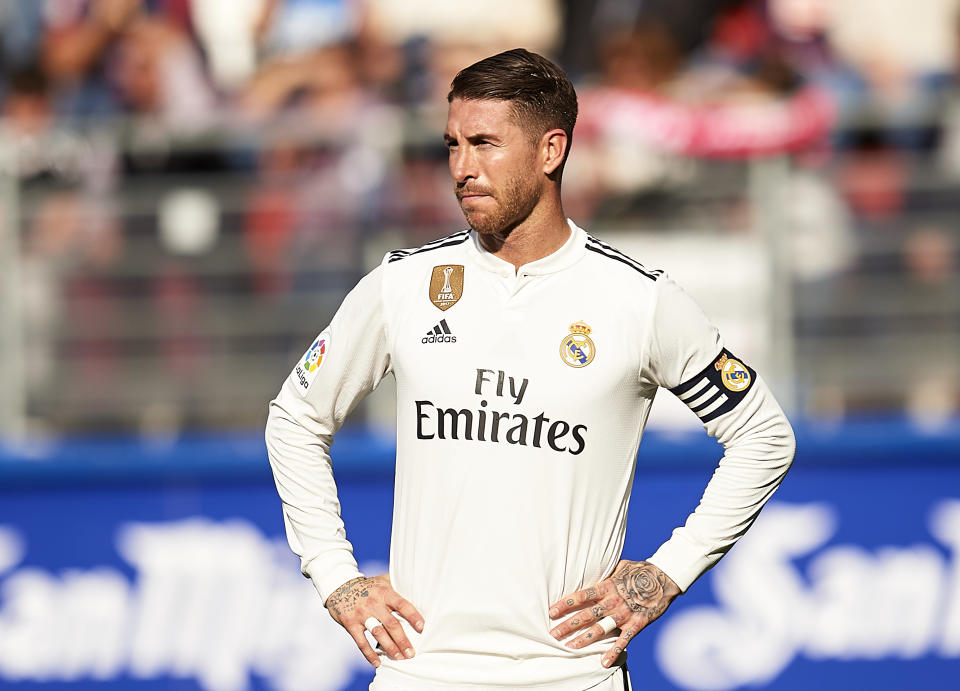Sergio Ramos denies doping after Football Leaks allegations

Real Madrid captain Sergio Ramos has “vehemently” denied doping one day after a Football Leaks report alleged that the 32-year-old defender tested positive for a banned substance following the 2017 Champions League final.
As part of the wide-ranging, multi-week investigation into global soccer, German outlet Der Spiegel’s latest peek at the sport’s grotesque underbelly delved into Real Madrid’s confrontations with doping regulators.
At the center of the investigation is Ramos, who allegedly had dexamethasone, an anti-inflammatory pain-reliever, in his system after beating Juventus in Cardiff last June.
On a second occasion, earlier this year, Ramos reportedly violated doping regulations by disobeying an anti-doping officer’s instructions and showering before a postgame test.
Ramos issues statement after doping allegations
Ramos initially declined to comment when approached by Der Spiegel. But on Saturday, he issued a statement:
Comunicado oficial | Official Announcement pic.twitter.com/dYYFMWKjj3
— Sergio Ramos (@SergioRamos) November 24, 2018
“I am vehemently opposed to doping,” Ramos wrote. “I have never participated, nor will I ever participate in, nor have I consented to, nor will I ever consent to, any form of doping.”
He then went on to address the two incidents detailed in the Der Spiegel report directly.
Ramos’ explanations for alleged doping violations
Ramos first gave his side of the 2018 “obstruction” case. His story, in part, jibed with Der Spiegel’s telling. “Given the time pressures on the team’s return journey” after an away game, he wrote, he wanted to shower.
Where his account differs is over whether the anti-doping official allowed him to shower. Ramos says he did, provided Ramos “remain[ed] in his presence at all times.” But per a document obtained by Der Spiegel:
The officer noted in his report that he prohibited Ramos from showering, in response to which Ramos expressed his “displeasure,” as did the Real Madrid team doctor, who was accompanying the star defender. According to the report, both complained that showering after matches was allowed. But the anti-doping officer claims that he did not back down and insisted that Ramos not shower before being tested.
But Sergio Ramos apparently decided to ignore the official and showered in front of him. “Despite my warning,” as the anti-doping officer wrote in his report. And despite the officer’s admonition that doing so could have serious consequences.
Contention over the Champions League final drug test
Ramos claims the 2017 positive test was “clarified and resolved formally in writing between the organizations,” by which he presumably means Real Madrid, UEFA and WADA. But that denial doesn’t absolve anybody of secretive wrongdoing.
Rather, the problem here, if the allegations are substantiated, is that UEFA seems to have given in to pressure from Real Madrid after the fact. European soccer’s governing body reportedly had Ramos’ positive urine sample. Then, from Der Spiegel:
Two days after the arrival of the report from Austria, a member of UEFA’s anti-doping unit contacted Ramos, 32, for an explanation. The player replied on July 10, addressing the UEFA employee by her first name. It was a brief statement of just four lines. The Real Madrid team doctor, he wrote, had treated him on the day before the game. All additional details, he noted, were elucidated in an attached “medical report” that the doctor had prepared. “I hope this fully clarifies the situation,” Ramos concluded.
The medical report, per Der Spiegel, claimed that Ramos had received an injection of Celestone Chronodose, another banned substance. Both it and dexamethasone are permitted in specific cases, when cleared by anti-doping officials beforehand. But Ramos’ use, per Der Spiegel, had not been cleared. So his use constituted a violation.
Real Madrid and Ramos averted punishment due to a club doctor’s willingness to play the role of scapegoat. From Der Spiegel:
Because Ramos suffers from “chronic pathologies” in his left knee and left shoulder, the doctor wrote, he had given the player two injections of dexamethasone on the day before the Champions League final. The fact that he had noted down the wrong drug in the doping report following the game was because of the “euphoria” resulting from winning the title and the “specific circumstances in which this doping control takes place.” Namely, His Majesty Juan Carlos, the former King of Spain, had dropped by the doping control station to visit Ramos as had the Spanish prime minister.
In the confusion, he had made a mistake, mixing up two similar substances that are subjected to the same criteria during a doping test. It was a “human error,” wrote Dr. A., “and therefore understandable.” He wrote that he never intended “to infringe any anti-doping regulation.”
UEFA accepted the explanation. The issue is whether it should have.
Conclusions from the Ramos doping report
On one hand, Ramos’ side of the story is fairly believable. And the material Der Spiegel obtained wasn’t as incriminating as many expected when it promised weeks ago that it had evidence of “positive doping tests of a multiple Champions League winner.”
On the other hand, there is evidence of wrongdoing ignored. Ramos said his legal team will consider taking action. But that’s a standard response to serious allegations against a powerful person. And so far, very little if any of Der Spiegel’s Football Leaks revelations have been successfully refuted.
More from Yahoo Sports:
• Embiid trolls Thompson after loss: ‘Cavaliers still run the East’
• West Virginia coach Holgorsen perplexed by penalties in Oklahoma loss
• Washington will play for Pac-12 title after beating Cougars in Apple Cup
• NFL experts pick which games should have your attention


